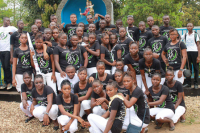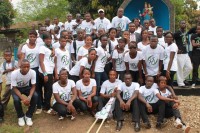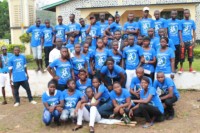 As a component of the Youth Sensitization Campaign against Ethnic Voting, Religious and Cultural Discriminations project which is being implemented by Youth in Action for Development, a Sierra Leonean youth led charity based in the eastern headquarter town of Kenema, the symposium on the “causes of and solutions to ethnic based politics, religious and cultural discriminations” took place on Saturday, 23rd November 2013 at the Holy Trinity Parish Hall in Kenema. Chaired by Mr. Edward Mando of KNSL, the symposium took many stakeholders to task prominent among which were the Deputy Mayor of Kenema municipality, representatives of various political parties, key government ministries, traditional and religious leaders.
As a component of the Youth Sensitization Campaign against Ethnic Voting, Religious and Cultural Discriminations project which is being implemented by Youth in Action for Development, a Sierra Leonean youth led charity based in the eastern headquarter town of Kenema, the symposium on the “causes of and solutions to ethnic based politics, religious and cultural discriminations” took place on Saturday, 23rd November 2013 at the Holy Trinity Parish Hall in Kenema. Chaired by Mr. Edward Mando of KNSL, the symposium took many stakeholders to task prominent among which were the Deputy Mayor of Kenema municipality, representatives of various political parties, key government ministries, traditional and religious leaders.
In his welcoming speech, the Project Coordinator, Othman Sheriff, stated that “ethnic based politics, religious and cultural discriminations are epidemics that are rapidly destroying the socio-economic fabrics of our beloved nation and they remained taboo topics till few months ago when we the youths of Kenema city broke the ice, by launching the Sensitization Campaign against Ethnic Voting, Religious and Cultural Discriminations in Sierra Leone, with funds from the United Nations Alliance of Civilization (UNAOC)”
Sheriff further revealed that the Youth of Kenema under the umbrella of YAD are  gradually winning the battle against the epidemics. “We started it few months ago with consultative and sensitization meetings with stakeholders including leaders of existing youth groups across the city and registration and verification of direct beneficiaries of this project. We then supported them to conduct executive elections among themselves which enabled them to identify leaders of their respective groups. Consequently, three solid heterogeneous groups namely: the Nyandeyama Youths in Action for Development (NYAD), Gbo-kakajama Youth in Action for Progress (GYAP) and Action Stars Youth Club (ASYC) have been created in the three political zones of Kenema municipality with more than 300 membership”, he proudly stated.
gradually winning the battle against the epidemics. “We started it few months ago with consultative and sensitization meetings with stakeholders including leaders of existing youth groups across the city and registration and verification of direct beneficiaries of this project. We then supported them to conduct executive elections among themselves which enabled them to identify leaders of their respective groups. Consequently, three solid heterogeneous groups namely: the Nyandeyama Youths in Action for Development (NYAD), Gbo-kakajama Youth in Action for Progress (GYAP) and Action Stars Youth Club (ASYC) have been created in the three political zones of Kenema municipality with more than 300 membership”, he proudly stated.
As for the past and upcoming activities, Sheriff disclosed that key executive members of the newly formed youth groups have been rigorously trained in various topics relevant to the attainment of the goal of this project. Some of the topics include, but not limited to: conflict management, youth leadership, gender equality, human-right, fundamentals of democracy, basic soccer rules etc. In addition to that, each group is currently engaged in effective soccer and volleyball training and drama rehearsal on the main themes of this project. The drama shall be presented by mid-December while the soccer and volleyball matches are expected to serve as the first Youth Cohesion Tournaments in Kenema Municipality. A Youth Cohesion Trophy is going to be placed which shall serve as an everlasting symbol of socio-cultural cohesion and friendly network among the youths in the municipality.
As for the symposium, Sheriff stated that he expected it to help discuss the causes  of and solutions to ethnic based politics, religious and cultural discriminations in this country so that necessary measures can be quickly taken in bid to stop them before they could engulf our beloved nation.
of and solutions to ethnic based politics, religious and cultural discriminations in this country so that necessary measures can be quickly taken in bid to stop them before they could engulf our beloved nation.
Delivering a speech on behalf of the Gbo-Kakajama Youth in Action for Progress, 18 years old Betty Betica Jalloh defined ethnic and regional based politics as a “situation where people only vote for candidates with whom they share the same tribe, ethnic or regional background regardless of their competence, track records and adversity to national interest”. “Since political independence”, she went further, “this system of politics has systematically taken precedence over patriotism, justice, human-right, democracy and good governance in Sierra Leone. A glaring prove to that is the infamous south-east and north-west block system of voting in all our elections. It has even become part and parcel of our cultures and traditions”. Betica further analysed the causes of and solutions to ethnic based politics in post-colonial Sierra Leone.
“Ladies and gentlemen”, she went further, “ if we the young generation are to inherit a healthy democracy and viable economy, its high time we stop voting for people based on familiarity, ethnicity and regionalism”. She then called on fellow youths to start using the five “W” and one “H” question words against our contestants, namely:
“Who am I voting for? Why am I voting for him/her? What has he/she got to do for this nation? Where will he/she get the resources from? When will he/she do it? And How will he/she do it?”
The above questions, she concluded, “can help every youth to digest every political manifesto, no matter how sophisticated the lies are”.
Delivering a speech on religious and cultural discriminations on behalf of the Action Star Youth Club, the Secretary General, Abubakar Sesay, stated: “whenever talking about religion and culture in post war Sierra Leone, many intellectuals usually refer to the few instances of inter-ethnic and Muslim/Christian marriages as signs of religious and cultural tolerance in the country. Yes, it’s true that some Sierra Leoneans are religiously and culturally tolerant. But when looked at the scenario from human right and democratic points of view, we should ask ourselves how many Sierra Leonean youths are allowed by their parents to freely practice religions different from that of the parents? How many Sierra Leonean youths are allowed to marry their desired husbands and wives without direct interference of their parents based on religious and cultural norms? How many young Christians are allowed to marry Muslims without forcing the woman to give up her own faith? How many youths are allowed to roam free without being forcefully initiated into secret societies that contribute little or nothing to their future? How many women are forced by traditional and religious norms to say “sorry” to their husbands as simple settlement methods of cases in which men were out-rightly wrong? How many girls are passing WASSCE without being coerced by their parents into calabash marriages while male members of the same family pursues to university based on the grounds that women are best useful as house wives and child bearers?”
Backar concluded by imploring Sierra Leonean policymakers to recognize articles 1, 16 and 18 of the Universal Declaration of Human Right which took place on 10th December 1948 in Paris:
Article 1: “All human beings are born free and equal in dignity and rights. They are endowed with reason and conscience and should act towards one another in a spirit of brotherhood”.
Article 16: “Men and women of full age, without any limitation due to race, nationality or religion, have the right to marry and to found a family. They are entitled to equal rights as to marriage, during marriage and at its dissolution. Marriage shall be entered into only with the free and full consent of the intending spouses”.
Article 18: “Everyone has the right to freedom of thought, conscience and religion; this right includes freedom to change his religion or belief, and freedom, either alone or in community with others and in public or private, to manifest his religion or belief in teaching, practice, worship and observance”.
The symposium ended with assurance by stakeholders present to look into the issues presented by the youths.
Vote of thanks was given by Hanna alpha of the Nyandeyama Youth in Action for Development (NYAD)


Be the first to comment